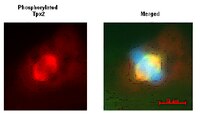07-1248 Sigma-AldrichAnti-phospho-Tpx2 (Ser738) Antibody
Detect phospho-Tpx2 (Ser738) using this Anti-phospho-Tpx2 (Ser738) Antibody validated for use in WB & IC.
More>> Detect phospho-Tpx2 (Ser738) using this Anti-phospho-Tpx2 (Ser738) Antibody validated for use in WB & IC. Less<<Recommended Products
Overview
| Replacement Information |
|---|
Key Spec Table
| Species Reactivity | Key Applications | Host | Format | Antibody Type |
|---|---|---|---|---|
| H, M, R, Rhesus Macaque | WB, ICC | Rb | Affinity Purified | Polyclonal Antibody |
| References |
|---|
| Physicochemical Information |
|---|
| Dimensions |
|---|
| Materials Information |
|---|
| Toxicological Information |
|---|
| Safety Information according to GHS |
|---|
| Safety Information |
|---|
| Storage and Shipping Information | |
|---|---|
| Storage Conditions | Stable for 1 year at 2-8°C from date of receipt. |
| Packaging Information | |
|---|---|
| Material Size | 100 µg |
| Transport Information |
|---|
| Supplemental Information |
|---|
| Specifications |
|---|
| Global Trade Item Number | |
|---|---|
| Catalogue Number | GTIN |
| 07-1248 | 04053252376801 |
Documentation
Anti-phospho-Tpx2 (Ser738) Antibody Certificates of Analysis
| Title | Lot Number |
|---|---|
| Anti-phospho-Tpx2 (Ser738) | 2472037 |
| Anti-phospho-Tpx2 (Ser738) - NRG1810094 | NRG1810094 |








